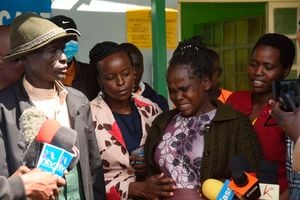Study shows religious leaders can change negative attitude on LGBTQ+ Kenyans

Members of LGBTQ+ at High Court on February 22, 2019 after a landmark ruling on the decriminalisation of gay people in Kenya. Research has demonstrated that religious leaders can change their negative attitudes and perspectives on LGBTQ+ Kenyanscan
The gulf dividing African Christian religious leaders and Lesbian, Gay, Bisexual, Transgender, and Queer (LGBTQ+) human rights activists is vast, but there is hope.
According to a study entitled: Facing Our Fears: The Impact of a 4-Day Training Intervention to Reduce Negative Perspectives on Sexual and Gender Minorities among Religious Leaders in Kenya, bias against sexual and gender minorities (SGMs) is not static but can be changed and that, consistent with the literature on attitudinal change, educational intervention and training can be effective in realizing such change.
The study correlated data points collected before the commencement of the training (pre-test), immediately after (post-test), and then 3 – 4 months later (follow-up).
A comparison of pre and post-test data showed that acceptance of gender diversity, lesbians and gay men significantly increased, and attitudes became more positive. Additionally, the social distance towards gay men, lesbians, and transgender persons became less.
While parallel changes between pre-and follow-up testing were also significant, there was no significant change between post-test and follow-up testing; indicating the impact of the training was maintained over time.
The observed changes appear to have been moderated by the gender of participants and their religious fundamentalism. Attitudes of men exhibited a more marked shift compared to women. It could be more negative initial attitudes. Participants ranked high on religious fundamentalism also changed more.
It is important to note that the training incorporated Biblical sections that call for love and non-discrimination. It did not challenge the passages used to condemn homosexuality. Because of this, it is unlikely that interpretations of the passages that condemn homosexuality would have changed.
It suggests that stigma against gender and sexual minorities is driven by prevailing social attitudes and religious fundamentalism and less by biblical prescriptions.
The study concludes that limited opportunities for interaction between religious leaders and LGBTQ+ persons and the criminalization of sexual minorities impedes the development of inclusive theological and pastoral practices and are detrimental to the freedom and rights of sexual minorities.
There seem to be two underlying narratives that dictate how LGBTQ+ conversations evolve. For most Christian religious leaders, it is an attempt to redefine the institution of marriage, while for the LGBTQ+ community, the focus is on their experiences of human rights violations.
The much-quoted story of the woman caught committing adultery (John 8: 1 – 11) helps to illustrate this polarity.
The LGBTQ+ community would prefer emphasis be on the example that Christ set. He set her free, saving her from death by violence.
He did not even condemn her! Religious leaders focus on the last sentence, “… go and do not sin again, while for LGBTQ+ people, it is the threat of violence that perpetually hangs over their heads.
In light of the study, we propose the following three pastoral interventions:
- Loving and compassionate pastoral response
- Severing the link between Christianity and colonialism
- Theology of grace versus the law – Can there be salvation for LGBTQ+ people?
This short article summarises a detailed version of the study findings. We encourage religious leaders and all Kenyans of goodwill to read the much richer article. To download and read at your own time, get the article from this website link:
We urge academicians and particularly theologians, to read the full journal article in the Journal of Sex Research.





